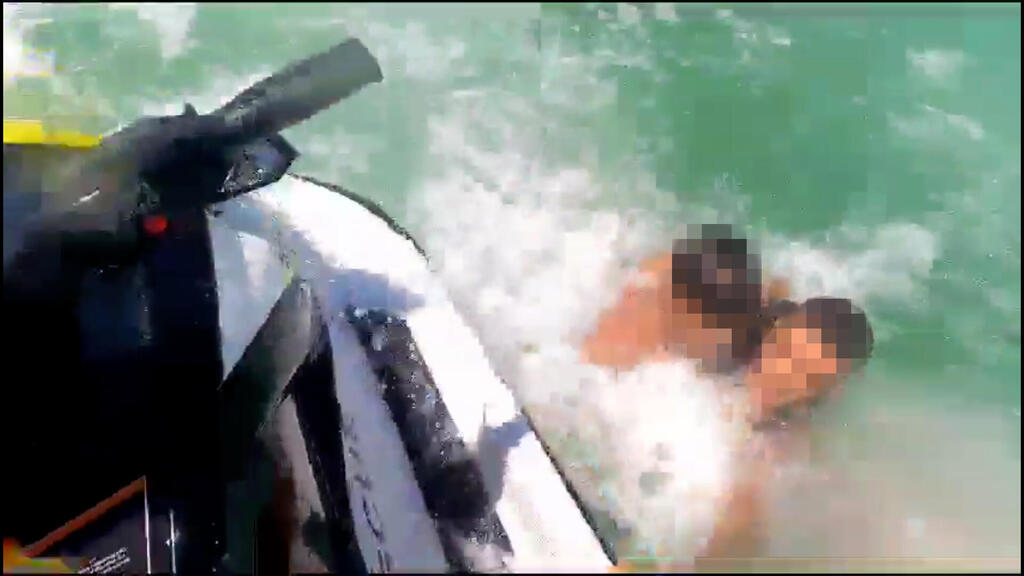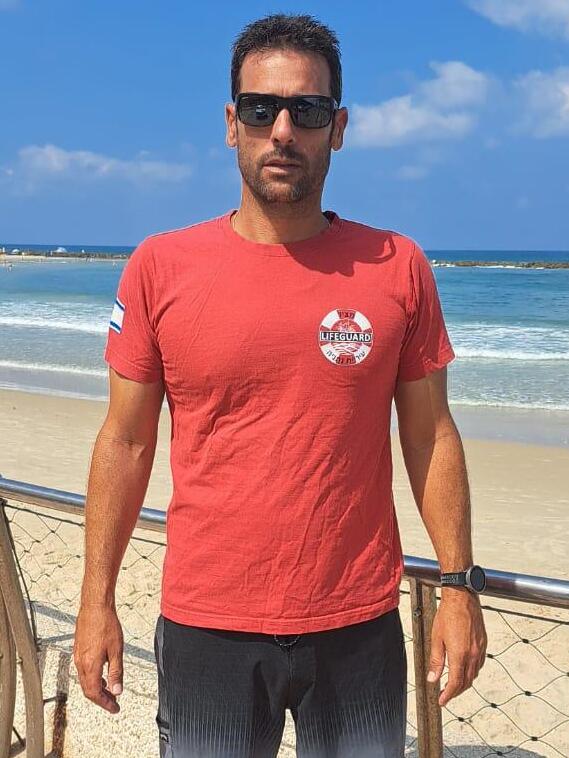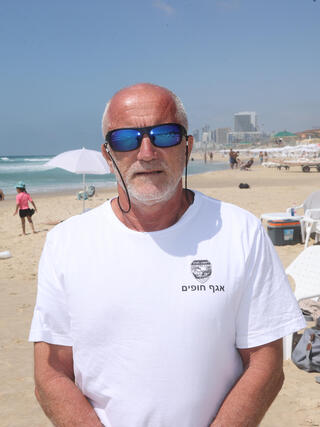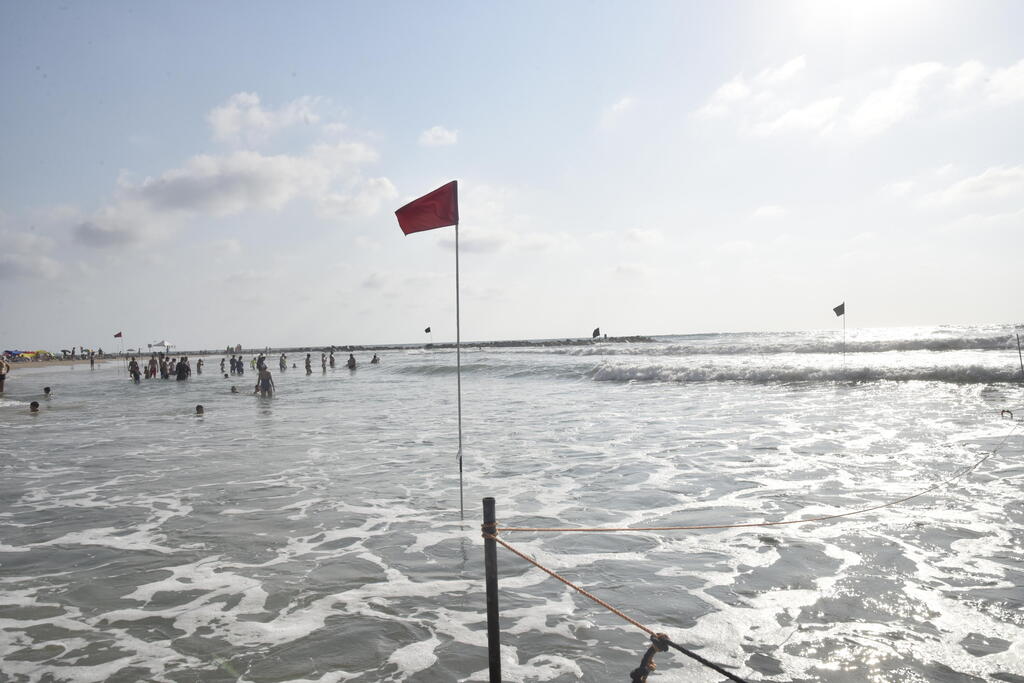Getting your Trinity Audio player ready...
Over the recent weekend, five tragic drownings occurred along Israel's beaches – in Hadera, near Caesarea, Nahariya, and two in Bat Yam. These heartbreaking events have sparked concerns about family trips to the beach and ensuring everyone's safe return home.
How can we swim safely in the sea, and more importantly, what should we do in an emergency if swept out to sea? Four seasoned lifeguards offer invaluable tips: remain calm despite natural panic, avoid swimming too fast and conserve energy, swim parallel to the shore to escape dangerous currents, and try to float. Most crucially, avoid swimming at unregulated beaches or outside lifeguard service hours.
Omri Ziv, the chief lifeguard of Netanya Municipality, points out that many recent drownings result from swimming at unregulated beaches or outside lifeguard hours. "Israelis often act impulsively. While most listen, unfortunately, many do not. People swim at unregulated beaches or outside designated hours without a lifeguard nearby, which is where most drownings occur, even in this season."
Eli Schwarzberg, head of the beaches department in Rishon Lezion and a lifeguard himself, echoes similar sentiments. "Most Israelis at the beach follow lifeguard instructions and settle in designated areas. Ninety percent choose regulated beaches with lifeguard stations, while 10% seek quieter, unregulated beaches. It's fine to stay on the dry part of an unregulated beach, but swimming there is forbidden. The sea is peaceful and enjoyable but can be deadly. If you encounter trouble, there will be no one to rescue you. The same applies to entering the water beyond designated hours. Don't go in for even a minute beyond lifeguard services. Unfortunately, it happens, and tragedies occur at nearly every beach in Israel. Follow instructions and guidelines, and everyone will return home safely."
Ziv notes another problem typical in Israel: disregarding lifeguard instructions even at regulated beaches. "Lifeguards mark safe swimming areas. The sea is ever-changing; it can be calm in the morning and stormy by afternoon. Israelis don't like to listen; they often ignore lifeguard directives, leading to trouble, and lifeguards need to rescue them. I, unfortunately, see this frequently among younger people. I also notice alcohol use – people drink and then enter the water. Teens on summer break roam at odd hours, sometimes with dire outcomes."
2 View gallery


Documented: A 15-year-old boy is rescued from drowning in Netanya
(Photo: Netanya Municipality)
Schwarzberg emphasizes: "The lifeguard is not a babysitter. By law, children up to age 13 must be accompanied by a parent in the water. Often, when there's a white flag, I see parents sitting, eating, drinking and talking on the phone while their children are alone in the water. This is strictly forbidden. Keep an eye on your children. Don't leave them unattended, neither on the beach nor in the sea."
"This applies to teenagers, but not only," Schwarzberg adds. "Even older individuals who drink and enter the water intoxicated can drown. However, during lifeguard hours, we usually identify such behaviors and attempt to prevent intoxicated individuals from entering the water – and this happens quite frequently. It's crucial for everyone to understand they might find themselves in a situation beyond their control in a dangerous area. If you plan to enter the water, don’t drink."
 Omri Ziv
Omri ZivConversely, not drinking water poses a life-threatening risk. "We also see many cases of dehydration," Ziv notes. "People sit in the sun without drinking water and collapse on the beach. Many enter the water without feeling thirsty. It's essential to drink plenty of water, wear hats and appropriate clothing for sun protection, and sit in the shade. It's crucial to ensure children stay hydrated at the beach. The sun, swimming exertion, excitement, running, and playing – children get dehydrated."
What should you do if caught in a drowning situation? How can you safely reach the shore?
"The primary rule for behavior in the water is to always try to stay calm," Ziv explains. "People often fight the current and swim with all their might. Even the best swimmer can’t swim against the sea. They get tired and drown. Conserve energy, float and don’t panic. The sea will eventually push you out. As challenging as it is in these situations, maintaining calm is essential. But let’s not reach that point; be smart beforehand and choose safe, regulated areas."
"Never try to swim toward the shore," Schwarzberg stresses. "Everyone thinks there are whirlpools, but these are channels formed by water flowing back to the sea. When water returns to the sea, it carves a channel. This channel is deadly because it's deceptive. The average person thinks this area is calmer, but it actually pulls you out to sea. This current is stronger and faster than an Olympic swimmer. Anyone trying to swim against it seals their fate. Immediately shout for help, raise your hands to be seen, and call rescue services. Until rescue forces arrive, you can swim north or south along the channel sides or try to climb onto a sand hill. You can also float and let the current carry you out a bit. That's fine as long as you know how to float."
Yossi Ariel adds his own tips: "It's crucial not to panic. Identify where the waves are and let the current take you in that direction. Instead of resisting and swimming to shore, swim parallel to the shore until you exit the current, in the area where the waves break, until you find yourself 'thrown' toward the shore with the water, not against it. If you're too tired to swim sideways out of the current, try to turn around, lie on your back, and float on the water. Remember that most drownings result from fatigue, swallowing water, and the stress of fighting strong currents and losing strength."
And what should you do if you see someone drowning?
Schwarzberg highlights avoiding mistakes that can often be fatal. "For us, a mass drowning is more than one person drowning, and when does it happen? When someone shouts for help and another person jumps in to assist. That drowning person has no ground under their feet. They're shouting, trying to keep their airway above water. Someone who comes to help doesn't know rescue techniques or the sea. The drowning person will grab onto the rescuer, lean on them, and drown them too because they're also in the current. When you see someone drowning and shouting for help, make an immediate call to MDA. We lifeguards also receive the alert. It goes to local authority centers that dispatch lifeguards. Secondly, shout to the person in trouble to hold on because they might despair."
 Eli SchwarzbergPhoto: Yariv Katz
Eli SchwarzbergPhoto: Yariv KatzKeeping an eye on small children is critical. At best, they might get lost, and at worst, they could drown due to parental inattention. "We have many children who get lost in the summer," says Omri Ziv, the chief lifeguard of Netanya Municipality. "Many people come to the beach, and a child loses direction. It's important to explain to children where the lifeguard station is because it's always high and prominent, and tell them to raise their head and go to the station if they get lost. Additionally, it's very important to supervise children in the water and not get distracted by phones. This is one of the highest risk factors on the beach."
'The lifeguard is not a babysitter'
"I dread the sight of a white flag," says Schwarzberg. "Why? Because when that flag is up, parents relax too much, thinking, 'Great, there's a lifeguard, so the kids can just run into the water on their own.' But the lifeguard is not a babysitter. By law, children under 13 need supervision. Often, when the white flag is flying, I see parents kicked back in their chairs, snacking, chatting on their phones, while their kids are alone in the water. This is absolutely forbidden. Keep your eyes on your children. Don’t leave them alone, not on the beach and certainly not in the sea."
Water sports enthusiasts also need to heed safety rules. "Last weekend, many jet skis were zooming in both the regulated and unregulated beaches," recounts Yossi Ariel, head of the lifeguard station at Haifa's Student Beach. "We had a jet ski with a dead engine drifting toward the shore with the waves, endangering people. We had to intervene, rescue and tow it to the maritime police. It's crucial that anyone on a jet ski carries a phone to report such incidents. In another case, a jet ski flipped, trapping people underneath. We rushed to rescue them. If you're not skilled at handling a jet ski, don’t ride one. Never let unlicensed individuals drive. Stick to permitted areas to avoid endangering others."
He adds: "If there are surfers nearby, they can be lifesavers. Surfers often ride in prohibited zones because they can't surf at regulated beaches. A surfer can paddle to a drowning person, and once that person grabs onto the surfboard, they’re safe – they can stay afloat until lifeguards arrive. If there aren’t any surfers, and people are playing volleyball on the beach, you can throw the ball to the drowning person. Once they grab it, they’ll float. It's vital – if you decide to enter the water to save someone, bring a floating device. Never go in with bare hands. It's like heading into battle without a weapon."
Safety in pools is also crucial, especially with small children. "Most pool drownings involve kids, not adults," says Daniel Levy, a lifeguard in Ashkelon. "A lifeguard can't watch everyone simultaneously. Understand they can’t see everyone at once. Never let kids go into the pool alone, thinking, 'It's okay, there's a lifeguard.' Don't rely solely on flotation devices like armbands and send them solo into the water. Know our limits: if you can’t swim, don’t cling to the railing and try to reach deep water. Stay where you can safely stand."
If you encounter trouble, Levy highlights an important safety rule. "Most pools aren't deep, but if you start to drown, let yourself sink to the bottom, push off, and when your head breaks the surface, shout for the lifeguard. They'll hear you and come to help. People around can also lend a hand."



